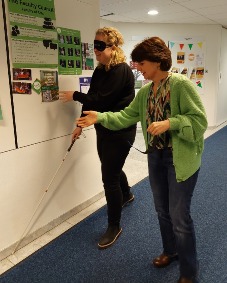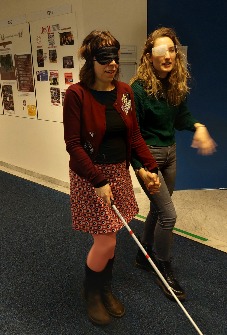Belevingsworkshop - Studeren met een visuele beperking
In een leslokaal van het Harmoniegebouw verzamelt zich een groep medewerkers voor een belevingsworkshop ‘Studeren met een visuele beperking’, verzorgd door Visio in opdracht van het Studenten Service Centrum. ‘Welkom, zou je even een bril willen opzetten en zoek dan even een plekje in de zaal.’ De bril is aan beide kanten afgeplakt, alle brillen blijken op een of andere manier het zicht te beperken: we zijn begonnen!

Focus op de stem
Als we eindelijk zitten, de bril blijft op, vertellen Visio’s ambulant begeleiders Henk Benjamins en Karin van Dijk iets over hun werk en studenten Inge (slechtziend) en Mireille (blind) iets over studeren met een visuele beperking. Ondertussen gaat er een telefoon, komt er nog een laatkomer binnen en lopen Henk en Karin door het lokaal - concentreer je, focus op de stem!
Ogen én hersenen
Henk vertelt: zien doe je met je ogen én hersenen. Het oog registreert kleuren, scherpte, licht en donker. Als er in het oog iets misgaat ontstaat er bijvoorbeeld kokervisus (alleen centraal deel is zichtbaar), maculadegeneratie (centraal deel ontbreekt) of hemianopsie (linker of rechter beeld ontbreekt). Als er in de hersenen iets misgaat met het verwerken van wat we zien, noemen we dat een cerebraal visuele stoornis, CVI. CVI is pas vrij recent ontdekt en bestaat uit een of meerdere stoornissen of zwakten in visuele functies door schade in hersendelen. Voor mensen met CVI kan het lastig zijn om overzicht te krijgen of om in- en uit te zoomen. CVI blijkt lastig te detecteren omdat mensen niet willen opvallen en het vaak weten te compenseren door bijvoorbeeld goed te onthouden waar iets ligt of waar ze langs moeten. Maar kijken met CVI kost tijd en vooral energie en kan zich uiten door faalangst, boosheid en onzekerheid.

Kansloos!
We vervolgen de workshop en zetten allemaal weer een (andere) bril op. Een deel van ons moet de wc opzoeken en de anderen gaat op hun smartphone inloggen op Brightspace - met bril kansloos! En hoe vind je de wc als je geen bordjes kunt lezen? Proberen te luisteren of het achter een deur galmt? Maar hopen dat je niet per ongeluk een leslokaal in loopt? Op zoals Mireille het altijd doet: op de geur van luchtverfrisser af?
Een paar aanpassingen helpen
Terug in het lokaal vertellen Inge en Mireille over het contact met studentendecanen en studieadviseurs, en over hoe ze voorafgaand aan elke nieuwe semester contact opnemen met individuele docenten: welke boeken worden gebruikt, in verband met bestellen aangepaste versies, hoe en onder welke omstandigheden worden de tentamens afgenomen? Wat zou het fijn zijn als docenten vooraf hun PowerPoints beschikbaar zouden kunnen stellen. Een paar aanpassingen aan Brightspace zou hen ook helpen. De aanwezige studentenadviseurs beamen grote verschillen per faculteit. Mireille: ‘Ook al krijg ik de mogelijkheid, ik wil niet apart van de rest tentamens maken om te voorkomen dat men denkt dat ik afkijk. Ik wil het niet specialer maken dan het voor mij is.
